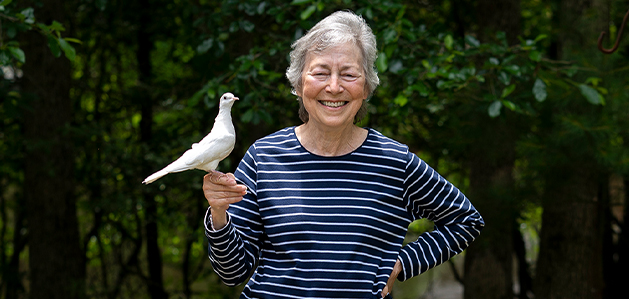Personalized Breast Cancer Treatment Puts Choice In Womens Hands
Breast cancer treatment is as individual as the woman who receives it. This is how treatment is being personalized to a woman's lifestyle, fears and family needs.
By James Crawford, MD, Breast Surgical Oncologist
Penn Medicine | Virtua Cancer Program
A 68-year-old grandmother received chemotherapy and endocrine therapy followed by surgery.
A 44-year-old executive underwent bilateral mastectomy followed by endocrine therapy.
A 36-year-old Army veteran had a lumpectomy followed by radiation therapy.
What do these cases illustrate? That breast cancer treatment is as individual as the women who receive it.
More breast cancer treatment options means more personal choices
Fifty years ago, the only breast cancer treatment option was mastectomy. Now, we have more alternatives, including lumpectomy, mastectomy, chemotherapy, radiation therapy, and endocrine therapy.
But, breast cancer and its treatment can differ widely between patients. For successful treatment, it's critical to take an individualized approach to every woman's (or man's) breast cancer. My job is not only to provide quality care, but to care for each patient as an individual. This means taking time to understand her life and fears, and help her choose the best treatment option. At Virtua, we take tremendous pride in our ability to personalize every patient's treatment.
Here are some questions that patients frequently ask.
Lumpectomy or mastectomy?
With most breast cancers, lumpectomy or mastectomy are treatment options. On average, a lumpectomy combined with radiation treatment will offer the same survival rate as a mastectomy.
In 2017, there was an upswing in patients asking about double mastectomies that was called the “Angelina Jolie effect.” But hers was a rare case: she had a genetic mutation that predisposed her to develop cancer in both breasts. The vast majority of women don’t have that risk. For them, a double mastectomy wouldn’t improve their outcomes or survival.
Will I need radiation therapy and/or chemotherapy?
The need for radiation or chemotherapy treatment depends on a few things:
- The cancer stage (when a cancer is diagnosed, it’s the process for determining how much a cancer has grown or spread)
- The size of the tumor(s)
- If lymph nodes are involved (test positive for cancer cells)
A key factor is whether or not the cancer has spread (metastasized). That’s because chemotherapy and radiation therapy work in different ways. Radiation targets a specific site, while chemotherapy works throughout the entire body. So if the cancer is confined to the breast, we can treat it with surgery and post-operative radiation. If it has spread, or is likely to, chemotherapy is needed.
What are targeted therapies?
We think of breast cancer as a single disease. But it isn’t. It’s a diverse group of diseases. Thanks to advances in genetic science, we’ve been able to identify five different kinds of breast cancer. Each has its own way of acting and multiplying. By creating drugs engineered to disrupt those unique behaviors, we can block the growth and spread of the cancer cells.
What is endocrine therapy?
Endocrine therapy is a type of targeted therapy that's also sometimes called “hormone therapy.” Many breast cancers are encouraged to grow by estrogen and progesterone. Endocrine therapy helps block this from happening. It's an important part of treatment for many women, but not all. It helps reduce the likelihood that the breast cancer returns in the future (recurrence) or of a new breast cancer from forming.
How will cancer treatment affect my quality of life?
There are some side effects with cancer treatment, but we offer a variety of support services and resources to help patients manage and cope with symptoms, pain, or stress. These tools are far superior compared to those in the past.
Here’s the bottom line: in the 1970s, the survival rate for breast cancer was around 70 percent.
Today, it’s more than 90 percent.
And that’s something that every one of us—doctors, patients, and their loved ones—can feel really good about.
Learn more about Virtua's breast cancer program or call 1-888-847-8823 to schedule an appointment with a Virtua breast surgeon.
There's So Much More to Explore
Discover expert insights, inspiring stories, health tips, and more by exploring the content below!

10 Reasons To Schedule Your Colonoscopy Today
Is an At-Home Colon Cancer Test a Good Alternative to a Colonoscopy?

The HPV Vaccine: A Powerful Shield Against Cervical Cancer

How Does Breast Density Affect Your Mammogram?

Breast Cancer Diagnosis Inspires Catherine to Help Others

Put Your Mammogram Appointment on the Top of Your To-Do List
Firefighter's Successful Lung Cancer Care at Virtua

A Breast Self-Exam Saved Kristen's Life

Protect Your Child From HPV and Related Cancers

What to Know About Cervical Cancer Screenings
6 Tips for an Easier Colonoscopy Prep

Rectal Cancer Surgery Gets Eileen Back to her Magical Life | Virtua Health
Robotic Surgery Helps Shelly Haney Return to Her Happy Place

